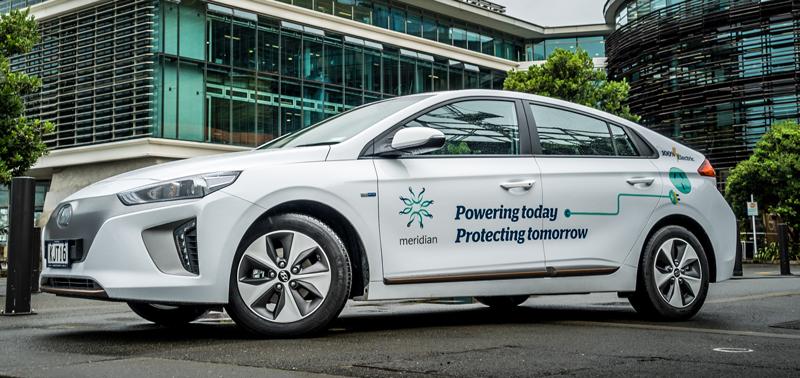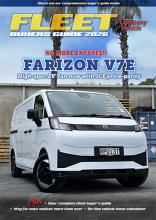Renewable energy generator Meridian Energy has embarked on a journey to ensure its vehicle fleet reflects its sustainable values, reports Annie Gray.
Meridian Energy’s procurement and property manager Nick Robilliard jokes that some in the fleet management industry might argue his company’s 100 strong vehicle fleet is of a modest enough size to be something close to nuisance value, but it is proving far from that as the company works to ensure its fleet reinforces the company’s values through the use of 100 percent renewable energy.
To this end Robilliard is actively building up the percentage of EVs Meridian owns but at the same time removing poorly utilised vehicles from the fleet, replacing diesel with fully-electric and shifting the use of vehicles to a “mobility-as-a-service” model (Maas) supported by EV car share programmes.
Earlier this year Meridian announced it would convert 50 percent of its vehicle fleet to fully-electric by June 2018, and challenged other New Zealand businesses to do the same. Currently 30 percent of the company’s fleet is made up of fully-electric vehicles and it will continue to increase this further, as more models that suit the company’s diverse needs become available.
Robilliard says that with Meridian being a 100 percent renewable energy generator, generating from wind and water, it was important that the company’s EV strategy echoed the advantages of using renewable energy. It is for this reason that Meridian has committed to 100 percent battery EVs and is not using PHEV.
The company has partnered with electric car share companies YooGo in Christchurch and Mevo in Wellington, which provide app-based, on-demand access to electric vehicles for car sharing, and Robilliard says both have ‘pods’ close to Meridian’s offices in each city making it a good option for staff.
While car sharing works for staff in most situations, Robilliard says there is a point when the economics mean that owning a vehicle or using traditional rental car providers are a better option.
As to cost savings that can be made from using a car share, versus owning or leasing a vehicle, Robilliard confirmed car share was one third of the annualised cost. Downtown Wellington car parking costs are typically $5,000 a year, so once you add in the cost of capital, other operating costs and depreciation it’s a ‘no brainer’.
The hardest thing to shift is employees who have an allocated vehicle. “You need to take the business on a journey with you.”
As to its own fleet and the move to EVs, Meridian has partnered with Hyundai to introduce the fully-electric Hyundai IONIQ to help electrify its fleet, which provides Meridian with the range needed for most of its urban travel needs with a range of more than 200 kilometres.
It is also currently looking at a medium sized SUV Kona EV, due to be released in 2018, as a way to electrify the balance of the passenger fleet to meet the needs of its agribusiness team which has different requirements.
For the maintenance side of the business, where utes are required, Robilliard notes there are no viable options to electrify this part of the fleet for the next 18-24 months until product hits the market. For now they’re using second generation Nissan e-NV200 vans in a limited capacity to introduce EVs to this part of the business.
He points out that at this end of the market the vehicle demands, conceptions and culture play a big part and there will be another journey to take the business on to understand the benefits of using electric vehicles.
Manapouri will be the first location to have a 100 percent electric van, fully fitted out, later this year. While Meridian has already installed charging stations at the lake, the location has challenges due to unpredictable weather, high mountain passes, and operating seven kilometres underground to the machine floor. So there will need to be some clear guidance on use.
Prior to the move to EVs, Robilliard had GPS installed into staff cars as part of the health and safety measures the company undertakes but found it also improved transparency on how the fleet is being used.
The GPS gave an accurate story on the distances and timing of the car-use countering arguments from some employees that they drive too long and far for an EV to be suitable. Within a relatively short period he found the data supplied by the GPS gave a good profile of each vehicle’s use showing employees were not going as far as they thought they were. This data meant the team could tell that an EV strategy would stack up.
One advantage, he says, is that they held back until they felt the price point of the vehicles was right for them and there was the infrastructure and standards in place around the country.
The maintenance of Meridian’s fleet is undertaken by Custom Fleet and while Meridian currently works with a vehicle life of three years, with EV technology Robilliard says he will sell them a year earlier only because the technology is moving so quickly and the range of the vehicles is likely to improve markedly every couple of years.
As to encouraging other companies to make the move to EVs Robilliard says that they have customers coming to them interested in making the move “and we can provide what we have learnt in the journey so far”.
This might mean showing a business the areas they need to think about before doing so, the purchasing channels and how data from GPS systems can be used to see if it is suitable for that company’s fleet needs.
Meridian is also supporting its customers that drive EVs with sharp overnight charging rates, helping provide vehicle charging infrastructure and working with other organisations to encourage more people to experience EVs.
So what message would he give to others in the fleet management industry looking to move into car sharing or the EV market?
Firstly, that there are some great key resources online, pointing to Drive Electric, ECCA and the Government website www.electricvehicles.govt.nz.
The second and most useful tool is to install GPS in a number of sample vehicles in the fleet and within three months it will give you enough data to know whether your fleet is ready for electrification.
Robilliard says too that understanding the total cost of ownership and questioning the profiles of vehicle use in the organisation will help deliver the best business outcome.
He says timing is also important as when the first EV vehicles were commercially available they were highly priced. Essentially EVs had reached a suitable price point, the legislation and standards were in place, and the company felt it had found the “sweet spot” for Meridian to enter the EV market.
While many businesses may have preconceptions as to whether EVs will work for them, Meridian is encouraging businesses on this path as they may find the commercial case stacks up better than expected.



